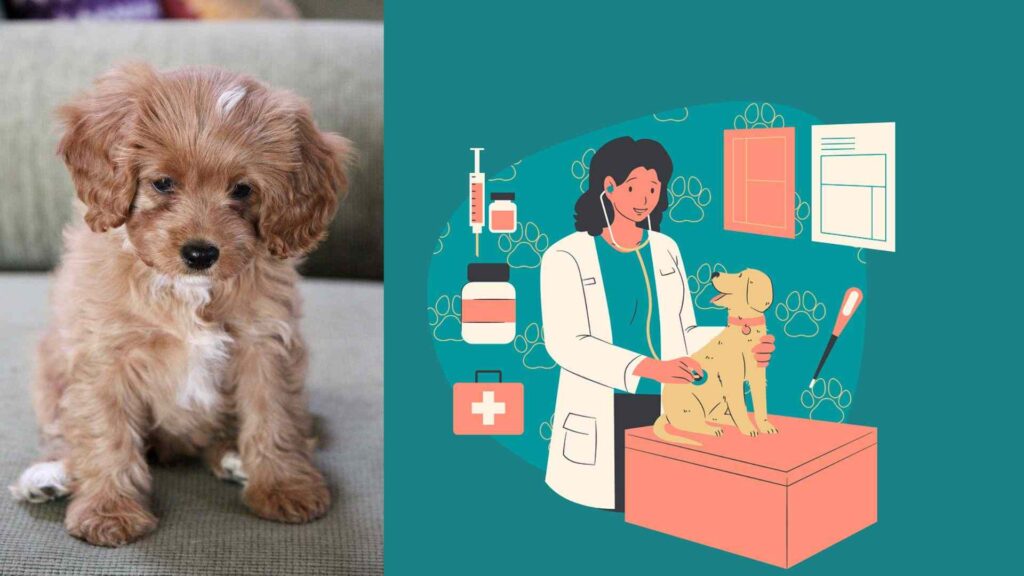Cavapoo Health
The Ultimate Guide for Health Issues and Care in Detail

Health and disease are characteristics associated with every living, breathing creature. Speaking of Cavapoos, even these tiny creatures are vulnerable to health issues, meaning if you don’t provide them proper care in time and address minor infections early on, they can become serious and, in some cases, even fatal.
Among the many health concerns found in Cavapoos, the most commonly observed health issues include ear infections, eye problems, heart conditions, patellar luxation, allergies, IVDD, hip dysplasia and more.
Initially, dog owners remain unaware due to unfamiliarity with signs of illness, and many lose their sweet companions for this reason. But don’t worry, as a dog breeder with over a decade of experience in the Cavapoo field, I know how to maintain Cavapoos’ health and identify signs early on to get to the root of the illness and contain it.
If you also want accurate information about your Cavapoo’s health, read every word of this article carefully. You will get all the information about Cavapoo health based on my practical experience. Let’s read in detail.
What is a Cavapoo – An Overview
A Cavapoo is a hybrid resulting from breeding a Cavalier King Charles Spaniel with a Poodle. This combination of two purebreds produces a mixed-breed dog with characteristics from both ancestral lines. Cavapoos are known to be friendly, energetic, and intelligent dogs. They make great family pets.
Cavapoos are a relatively new breed of dog. This mixed-breed dog first originated in the United States during the 1990s when breeders crossed Cavalier King Charles Spaniels with Poodles. The intent behind initially developing this hybrid combination was to create a new dog breed exhibiting the best traits of both parent lineages. Cavapoos have become very popular as family dogs thanks to their sweet temperament and cute looks.
Common Health Problems in Cavapoos
As a mixed breed, cavapoos have a chance of developing some of the inherited health conditions seen in Cavalier King Charles Spaniels and Poodles. Monitoring for issues common to both parental lines is recommended for owners of these hybrid dogs. Here are some of the most common health issues seen in Cavapoos:
Ear Infections
The smallest Cavapoos’ floppy ears trap moisture. Combined with allergies, this makes ear infections more likely. Check and clean your ears regularly.
Indications that a cavapoo may be suffering from an ear infection include frequent head shakes likely due to irritation or discomfort, excessive scratching focused directly on their ears, and a foul odor emanating from the ear canal.
Eye Issues (Progressive Retinal Atrophy)
Occasionally, cavapoos can be prone to certain vision-related conditions such as cataracts or gradual optical nerve deterioration known as progressive retinal atrophy, potentially inherited from similar predispositions in one or both ancestral purebred lineages.
Cataracts cause cloudiness in the eye lens, which can lead to blindness if not treated. Progressive retinal atrophy also causes vision loss. Signs of eye issues include cloudy eyes, increased clumsiness or bumping into things, and reluctance to go up and down stairs.
Syringomyelia
Syringomyelia happens when fluid builds up and puts pressure on a Cavapoo’s spinal cord. This causes nerve problems and pain. Dogs may constantly scratch at their necks. The cause is often unknown but sometimes linked to skull/spine issues.
Medicines, therapy, using raised bowls and avoiding collars can help manage discomfort. In bad cases, surgery is an option but has risks. Catching it early makes treatment more effective.
Heart Conditions (mitral valve disease)
A potential health condition cavapoos may develop due to their Cavalier King Charles Spaniel heritage is a cardiac issue called mitral valve disease, which involves incomplete closure of the mitral valve separating the heart’s left upper and lower chambers, resulting in backflow of blood. Dogs with this condition may tire easily or have a cough.
Another heart condition Cavapoos can develop is dilated cardiomyopathy. This is where the heart becomes enlarged and cannot pump blood efficiently. Signs include weakness, collapse, and trouble breathing.
Patellar Luxation
This condition happens when the kneecap slips out of place. It is common in small dogs like the Cavapoo. Mild cases may not cause symptoms. More severe cases cause lameness and pain in the hind legs.
Signs of patellar luxation include skipping or hopping while running, holding one hind leg up, and reluctance to jump or go upstairs. Mild cases can be managed with joint supplements or anti-inflammatory medication from your vet. More serious cases may require surgery.
Hernias
Hernias happen when organs push out through weak spots in the dog’s belly muscles. Small hernias may not bother dogs much. But bigger ones are painful and can cause dangerous infections if untreated. Surgery to close holes and realign muscles fixes the problem. See your vet if your Cavapoo shows signs of a hernia. Acting fast prevents added health risks.
Skin Allergies
Cavapoos can be prone to skin allergies and irritation. Signs include excessive licking, chewing, or scratching at their skin, feet, ears, or rear end. Red, irritated skin and recurrent ear or skin infections can also indicate allergies.
Food allergies and environmental allergies are common triggers. See your vet to identify the allergen. Treatment typically involves dietary changes, supplements, and/or medication to control itching and inflammation. Keeping the coat trimmed can also help minimize irritation.
Intervertebral Disk Disease
This spinal condition happens when the disks between the vertebrae bulge or rupture into the spinal cord space. It often occurs in the back or neck. Signs include weakness, uncoordinated movements, and paralysis.
IVDD is often caused by genetic factors. Injury or straining the neck or back can also trigger it. Steroid therapy, crate rest, and physical therapy are common treatments. Surgery may be needed in severe cases.
Hip Dysplasia
Hip dysplasia, an improperly formed hip socket that can lead to mobility issues, is a skeletal condition cavapoos may potentially develop as a result of inheriting the predisposition from either their Cavalier King Charles Spaniel or Poodle ancestors. This leads to arthritis and joint pain.
Signs include limping, difficulty standing up or climbing, and decreased activity levels. Maintaining a healthy weight and proper nutrition can help manage arthritis pain. More severe cases may require medication or surgery.
Epilepsy in Cavapoos
Epilepsy means dogs have seizures. Sometimes, injury or another health problem causes it, too. There are different types of seizures. Some dogs shake a lot, while others barely show signs. Attacks happen rarely or often. Excitement, lack of sleep, and stress may trigger them.
If your Cavapoo has epilepsy, give medicines on schedule. Skipping doses allows more seizures. Controlling these events lets dogs stay safe. Discuss options with your veterinarian to manage this condition.
Key symptoms/signs and corresponding diseases or health issues affecting Cavapoos
Disease
Symptoms/Signs
Progressive Retinal Atrophy
Loss of vision at night, anxiety in dark areas, clumsiness, dilated pupils, cloudy eyes
Luxating Patella
Pain, difficulty in movement, lameness, hunched, lower back
Hip & Elbow Dysplasia
Difficulty in movement, pain, stiffness, reluctance to exercise, loss of muscle mass
Epilepsy
Seizures, anxiety, excessive drooling, facial, twitching, shaking, trembling, falling over
Hernias
Loss of appetite, vomiting, lethargy, cramping, abdominal pain, swelling, excessive vocalizations
Syringomyelia
Phantom scratching and licking, changed behavior, reluctance to jump or run, crying, whining
How to Keep Your Cavapoo Healthy
While Cavapoos can be prone to certain health issues, there are many things you can do to keep your dog as healthy as possible:
Wrapping it Up
While Cavapoos can be susceptible to certain health problems, they generally have a good life expectancy. With proper care, regular vet checkups, and early treatment when necessary, most Cavapoos live a normal lifespan of 10-15 years or longer.
Their naturally happy and energetic temperament means Cavapoos thrive when given adequate exercise and quality time with their families. By providing a preventive healthcare routine, monitoring for any signs of illness, and partnering closely with your veterinarian, you can help ensure your Cavapoo lives a full, happy, and comfortable life.
